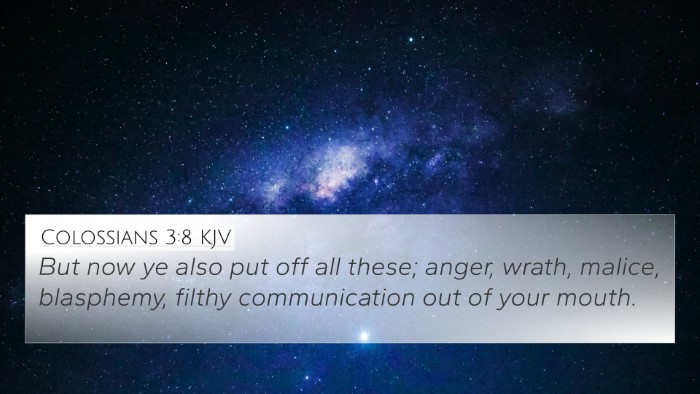Understanding Proverbs 4:24
Proverbs 4:24 states: "Put away from thee a froward mouth, and perverse lips put far from thee."
Summarized Meaning and Insights
This verse emphasizes the importance of guarding our speech, aligning it with the overarching wisdom that Proverbs offers throughout its chapters. Let’s explore the insights derived from public domain commentaries, such as those by Matthew Henry, Albert Barnes, and Adam Clarke.
Matthew Henry's Commentary
Matthew Henry notes that speech is a powerful tool. Our words can bring life or death, and hence, it is crucial to avoid a "froward" or perverse mouth. The term 'froward' refers to a disposition that is rebellious or contrary to the standards of righteousness.
- This verse serves as an admonition to not only refrain from speaking outright lies or cruel remarks but also to avoid any form of conversation that strays from truth and integrity.
- The implication is that our speech reflects our inner spiritual condition, thus a pure heart will contribute to pure words.
Albert Barnes' Notes
Albert Barnes elaborates on the idea that froward speech can lead to moral corruption and relationships that are not grounded in love or truth. He stresses the need for discernment in our interactions and communication.
- Barnes connects this verse with the broader theme in Proverbs of wisdom and the behavior of wise individuals contrasting with those who are foolish.
- He also highlights that the admonition to "put far from thee" suggests an active stance in removing negativity, advising believers to be proactive in steering clear of corrupt influences.
Adam Clarke's Commentary
According to Adam Clarke, this verse is a direct call to cultivate personal integrity. Clarke points out that frowardness can manifest as hypocrisy, which not only damages the individual but ultimately hinders their relationship with God.
- He encourages individuals to seek out virtues that oppose frowardness, such as truthfulness and kindness in speech.
- Clarke emphasizes that the moral character of a person is often revealed through their words, urging meticulous attention to the content and tone of our conversations.
Cross-References
Proverbs 4:24 is connected to several other Bible verses that enhance its message:
- Proverbs 10:31: "The mouth of the just bringeth forth wisdom: but the froward tongue shall be cut off."
- James 3:10: "Out of the same mouth proceedeth blessing and cursing. My brethren, these things ought not so to be."
- Psalm 34:13: "Keep thy tongue from evil, and thy lips from speaking guile."
- Proverbs 21:23: "Whoso keepeth his mouth and his tongue keepeth his soul from troubles."
- Colossians 3:8: "But now ye also put off all these; anger, wrath, malice, blasphemy, filthy communication out of your mouth."
- Ephesians 4:29: "Let no corrupt communication proceed out of your mouth, but that which is good to the use of edifying, that it may minister grace unto the hearers."
- Matthew 12:34: "For out of the abundance of the heart the mouth speaketh."
Thematic Connections and Analysis
Connecting Proverbs 4:24 to other biblical principles, we see an overarching theme of the importance of our verbal expressions. Throughout Scripture, we are urged to engage in speech that results in encouragement, truth, and harmony among believers. This is foundational for the body of Christ as it reflects our character and relationship with God.
Through systematic cross-referencing, we uncover how biblical texts engage in inter-Biblical dialogue, revealing a cohesive message about the righteousness of speech:
- Cross-referencing Biblical texts enables a broader understanding of how the Bible addresses the impact of our words.
- Bible verse comparisons illustrate common themes of integrity, demonstrating the continual exhortation to uphold pure communication.
- Scriptural cross-referencing allows us to see God's intention for our words to align with His divine wisdom and purpose.
Tools for Cross-Referencing
For those looking to deepen their understanding through cross-referencing Bible study methods, utilizing a Bible concordance or a Bible cross-reference guide can facilitate connection between verses. Moreover, employing a cross-reference system can uncover links across both the Old and New Testament.
Conclusion
Proverbs 4:24 serves not merely as a caution but as an essential framework for living a life of integrity. Understanding its implications through comparative Bible verse analysis reveals the significant power embedded in our communication, urging a commitment to righteousness. This is not only vital for personal conduct but crucial for sustaining community spirit among believers.














